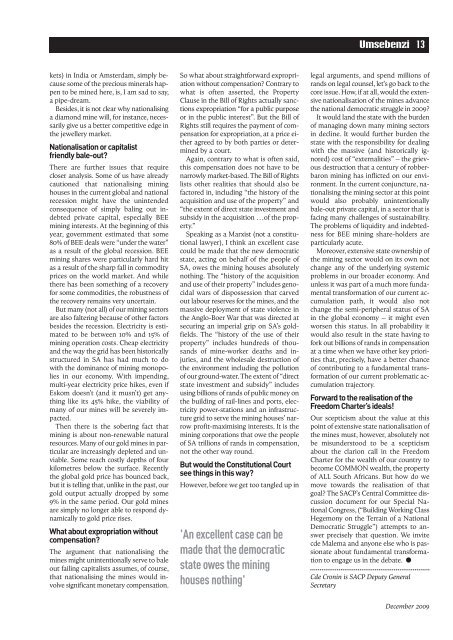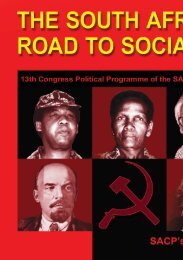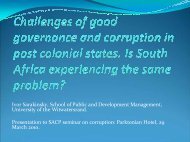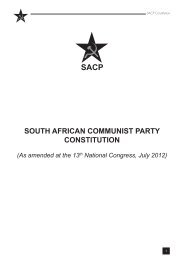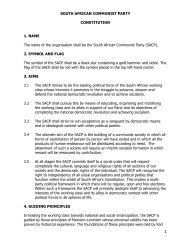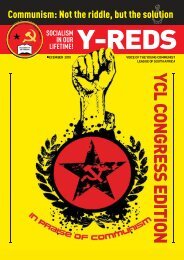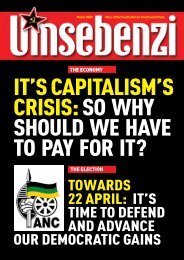Forward to Socialism!! - South African Communist Party
Forward to Socialism!! - South African Communist Party
Forward to Socialism!! - South African Communist Party
Create successful ePaper yourself
Turn your PDF publications into a flip-book with our unique Google optimized e-Paper software.
Umsebenzi 13<br />
kets) in India or Amsterdam, simply because<br />
some of the precious minerals happen<br />
<strong>to</strong> be mined here, is, I am sad <strong>to</strong> say,<br />
a pipe-dream.<br />
Besides, it is not clear why nationalising<br />
a diamond mine will, for instance, necessarily<br />
give us a better competitive edge in<br />
the jewellery market.<br />
Nationalisation or capitalist<br />
friendly bale-out?<br />
There are further issues that require<br />
closer analysis. Some of us have already<br />
cautioned that nationalising mining<br />
houses in the current global and national<br />
recession might have the unintended<br />
consequence of simply baling out indebted<br />
private capital, especially BEE<br />
mining interests. At the beginning of this<br />
year, government estimated that some<br />
80% of BEE deals were “under the water”<br />
as a result of the global recession. BEE<br />
mining shares were particularly hard hit<br />
as a result of the sharp fall in commodity<br />
prices on the world market. And while<br />
there has been something of a recovery<br />
for some commodities, the robustness of<br />
the recovery remains very uncertain.<br />
But many (not all) of our mining sec<strong>to</strong>rs<br />
are also faltering because of other fac<strong>to</strong>rs<br />
besides the recession. Electricity is estimated<br />
<strong>to</strong> be between 10% and 15% of<br />
mining operation costs. Cheap electricity<br />
and the way the grid has been his<strong>to</strong>rically<br />
structured in SA has had much <strong>to</strong> do<br />
with the dominance of mining monopolies<br />
in our economy. With impending,<br />
multi-year electricity price hikes, even if<br />
Eskom doesn’t (and it musn’t) get anything<br />
like its 45% hike, the viability of<br />
many of our mines will be severely impacted.<br />
Then there is the sobering fact that<br />
mining is about non-renewable natural<br />
resources. Many of our gold mines in particular<br />
are increasingly depleted and unviable.<br />
Some reach costly depths of four<br />
kilometres below the surface. Recently<br />
the global gold price has bounced back,<br />
but it is telling that, unlike in the past, our<br />
gold output actually dropped by some<br />
9% in the same period. Our gold mines<br />
are simply no longer able <strong>to</strong> respond dynamically<br />
<strong>to</strong> gold price rises.<br />
What about expropriation without<br />
compensation?<br />
The argument that nationalising the<br />
mines might unintentionally serve <strong>to</strong> bale<br />
out failing capitalists assumes, of course,<br />
that nationalising the mines would involve<br />
significant monetary compensation.<br />
So what about straightforward expropriation<br />
without compensation? Contrary <strong>to</strong><br />
what is often asserted, the Property<br />
Clause in the Bill of Rights actually sanctions<br />
expropriation “for a public purpose<br />
or in the public interest”. But the Bill of<br />
Rights still requires the payment of compensation<br />
for expropriation, at a price either<br />
agreed <strong>to</strong> by both parties or determined<br />
by a court.<br />
Again, contrary <strong>to</strong> what is often said,<br />
this compensation does not have <strong>to</strong> be<br />
narrowly market-based. The Bill of Rights<br />
lists other realities that should also be<br />
fac<strong>to</strong>red in, including “the his<strong>to</strong>ry of the<br />
acquisition and use of the property” and<br />
“the extent of direct state investment and<br />
subsidy in the acquisition …of the property.”<br />
Speaking as a Marxist (not a constitutional<br />
lawyer), I think an excellent case<br />
could be made that the new democratic<br />
state, acting on behalf of the people of<br />
SA, owes the mining houses absolutely<br />
nothing. The “his<strong>to</strong>ry of the acquisition<br />
and use of their property” includes genocidal<br />
wars of dispossession that carved<br />
out labour reserves for the mines, and the<br />
massive deployment of state violence in<br />
the Anglo-Boer War that was directed at<br />
securing an imperial grip on SA’s goldfields.<br />
The “his<strong>to</strong>ry of the use of their<br />
property” includes hundreds of thousands<br />
of mine-worker deaths and injuries,<br />
and the wholesale destruction of<br />
the environment including the pollution<br />
of our ground-water. The extent of “direct<br />
state investment and subsidy” includes<br />
using billions of rands of public money on<br />
the building of rail-lines and ports, electricity<br />
power-stations and an infrastructure<br />
grid <strong>to</strong> serve the mining houses’ narrow<br />
profit-maximising interests. It is the<br />
mining corporations that owe the people<br />
of SA trillions of rands in compensation,<br />
not the other way round.<br />
But would the Constitutional Court<br />
see things in this way?<br />
However, before we get <strong>to</strong>o tangled up in<br />
'An excellent case can be<br />
made that the democratic<br />
state owes the mining<br />
houses nothing'<br />
legal arguments, and spend millions of<br />
rands on legal counsel, let’s go back <strong>to</strong> the<br />
core issue. How, if at all, would the extensive<br />
nationalisation of the mines advance<br />
the national democratic struggle in 2009?<br />
It would land the state with the burden<br />
of managing down many mining sec<strong>to</strong>rs<br />
in decline. It would further burden the<br />
state with the responsibility for dealing<br />
with the massive (and his<strong>to</strong>rically ignored)<br />
cost of “externalities” – the grievous<br />
destruction that a century of robberbaron<br />
mining has inflicted on our environment.<br />
In the current conjuncture, nationalising<br />
the mining sec<strong>to</strong>r at this point<br />
would also probably unintentionally<br />
bale-out private capital, in a sec<strong>to</strong>r that is<br />
facing many challenges of sustainability.<br />
The problems of liquidity and indebtedness<br />
for BEE mining share-holders are<br />
particularly acute.<br />
Moreover, extensive state ownership of<br />
the mining sec<strong>to</strong>r would on its own not<br />
change any of the underlying systemic<br />
problems in our broader economy. And<br />
unless it was part of a much more fundamental<br />
transformation of our current accumulation<br />
path, it would also not<br />
change the semi-peripheral status of SA<br />
in the global economy – it might even<br />
worsen this status. In all probability it<br />
would also result in the state having <strong>to</strong><br />
fork out billions of rands in compensation<br />
at a time when we have other key priorities<br />
that, precisely, have a better chance<br />
of contributing <strong>to</strong> a fundamental transformation<br />
of our current problematic accumulation<br />
trajec<strong>to</strong>ry.<br />
<strong>Forward</strong> <strong>to</strong> the realisation of the<br />
Freedom Charter’s ideals!<br />
Our scepticism about the value at this<br />
point of extensive state nationalisation of<br />
the mines must, however, absolutely not<br />
be misunders<strong>to</strong>od <strong>to</strong> be a scepticism<br />
about the clarion call in the Freedom<br />
Charter for the wealth of our country <strong>to</strong><br />
become COMMON wealth, the property<br />
of ALL <strong>South</strong> <strong>African</strong>s. But how do we<br />
move <strong>to</strong>wards the realisation of that<br />
goal? The SACP’s Central Committee discussion<br />
document for our Special National<br />
Congress, (“Building Working Class<br />
Hegemony on the Terrain of a National<br />
Democratic Struggle”) attempts <strong>to</strong> answer<br />
precisely that question. We invite<br />
cde Malema and anyone else who is passionate<br />
about fundamental transformation<br />
<strong>to</strong> engage us in the debate.<br />
Cde Cronin is SACP Deputy General<br />
Secretary<br />
December 2009


